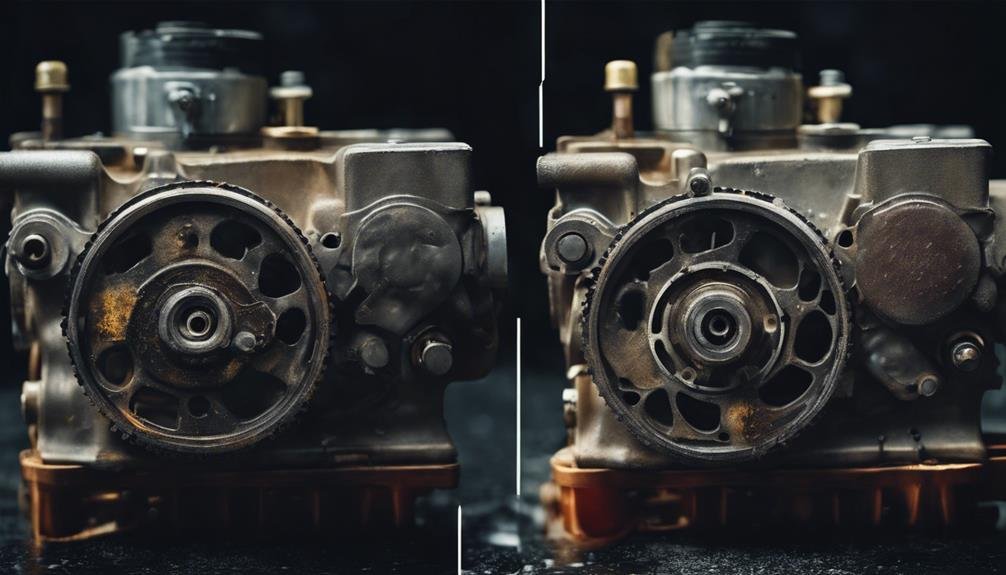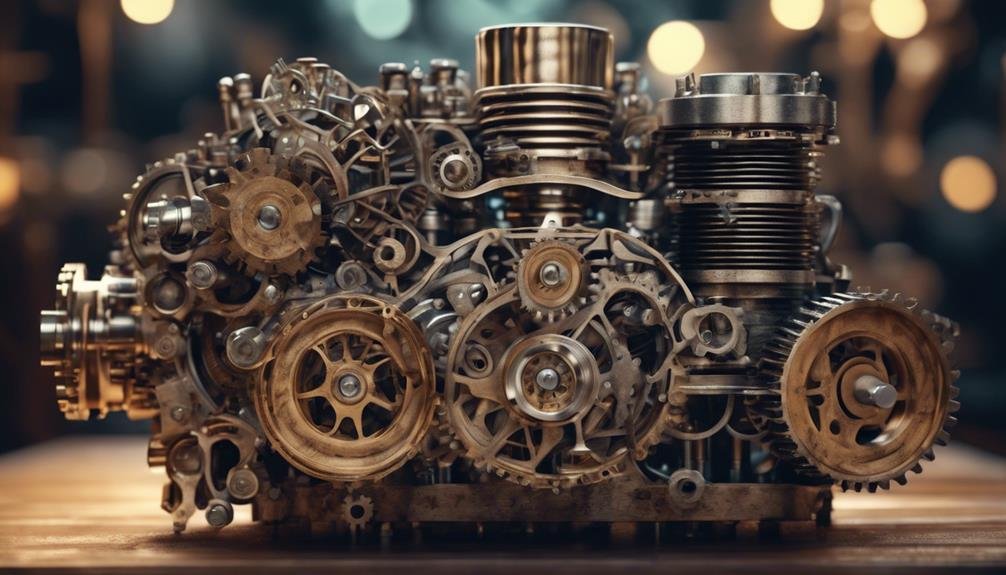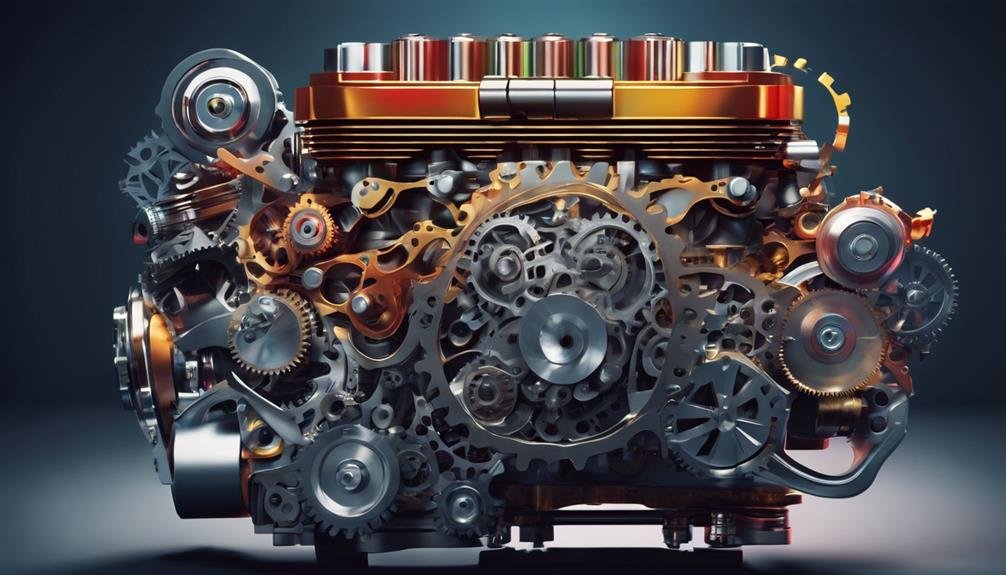Your timing belt plays a critical role in synchronizing your engine's cylinders, ensuring that valves open and close in harmony with pistons, and preventing costly engine damage. It synchronizes the crankshaft and camshaft, controlling valve opening and closing to facilitate a precise air-fuel mixture, preventing misfires and poor engine performance. By doing so, it prevents piston-valve collisions, ensuring cylinders fire at the exact right moment for reliability. Proper valve operation is vital for engine efficiency and effectiveness, and your timing belt makes it possible. Want to know more about how this vital component impacts your engine's performance?
Key Takeaways
- The timing belt synchronizes the crankshaft and camshaft for precise timing, ensuring valves open and close at the right moment for efficient engine operation.
- It prevents misfires, poor engine performance, and engine damage by preventing piston-valve collisions and ensuring cylinders fire at the exact right moment.
- The timing belt guarantees harmonious operation of valves and pistons, ensuring smooth engine operation and reducing noise and vibrations.
- It ensures efficient engine performance by synchronizing valve opening and closing, allowing for the perfect air-fuel mixture.
- The timing belt's precise control of valve operation is essential for engine efficiency, effectiveness, and reliability.
Synchronizing Engine Cylinders
As you investigate the inner workings of your engine, you'll discover that the timing belt plays a vital role in synchronizing the rotation of the crankshaft and camshaft, ensuring that the engine's cylinders fire in perfect harmony.
This synchronization is essential, as it allows the engine to run smoothly and efficiently. The timing belt's teeth mesh with gears on the camshaft and crankshaft, maintaining the precise timing necessary for excellent engine performance.
This intricate dance of moving parts relies heavily on the timing belt's ability to synchronize the cylinders, ensuring that each one fires at the exact right moment. When the timing belt is operating correctly, the engine's cylinders work together seamlessly, producing the power and efficiency you need on the road.
With the timing belt doing its job, you can rely on your engine to deliver a smooth, reliable ride.
Ensuring Proper Valve Operation
Controlling the precise opening and closing of valves in your engine, the timing belt guarantees that air and fuel are properly mixed and ignited, allowing your engine to run efficiently and effectively.
As you drive, the timing belt synchronizes the camshaft with the crankshaft, ensuring that valves open and close at the right time. This precise valve operation is crucial, as it allows air and fuel to enter the combustion chamber and ignite at the perfect moment, producing the power your engine needs.
Without proper valve operation, your engine would struggle to run, or worse, suffer from serious engine damage. The timing belt's role in ensuring proper valve operation can't be overstated, as it prevents issues like misfires, poor engine performance, and even engine failure.
Preventing Engine Damage

Your engine's well-being relies on the timing belt to prevent valves from being struck by pistons, which can lead to costly repairs and potentially catastrophic engine damage.
If the timing belt breaks, the pistons can collide with the valves, causing significant damage to the engine. This is why regular maintenance of the timing belt is important to prevent engine damage.
Failure to replace the timing belt at the recommended interval can result in devastating consequences, including costly repairs or even engine replacement. By prioritizing timing belt replacement, you can avoid major engine issues and maintain peak performance.
It's vital to stay on top of maintenance to prevent engine damage. Remember, a properly functioning timing belt is the initial line of defense against engine damage, so don't neglect this critical component.
Maintaining Engine Performance
Properly maintaining your timing belt is vital for maintaining your engine's peak performance, guaranteeing that your vehicle runs smoothly and efficiently. By doing so, you'll prevent major engine damage and costly repairs down the line.
Failure to replace your timing belt can result in valves being struck by pistons, leading to expensive and time-consuming repairs. When it's time to replace your timing belt, it's recommended to change the water pump simultaneously, as this can help prevent future issues.
Timely replacement of the timing belt can save you money in the long run, and it's crucial for maintaining top engine performance. By prioritizing proper maintenance, you'll ensure that your engine runs smoothly, efficiently, and reliably.
The Role of Timing Belts

As you investigate the inner workings of your engine, you'll find that timing belts play an important role in synchronizing the movement of valves and pistons. These critical components are made of a durable rubber compound with teeth, allowing them to precisely control the opening and closing of engine valves.
By synchronizing the camshaft and crankshaft, timing belts guarantee that valves and pistons work in harmony, preventing costly engine damage. Unlike chains or gears, timing belts are known for being quieter and more efficient, making them a crucial part of your engine's operation.
As you rely on your engine to get you where you need to go, it's essential to keep in mind that timing belts require regular maintenance to function properly. By replacing your timing belt every 60,000 to 90,000 miles, you can rest assured that your engine will continue to run smoothly and efficiently.
Timing Belt Function Explained
By controlling the precise timing of valve openings and closings, your timing belt guarantees that air and fuel are properly mixed and ignited, ultimately resulting in efficient engine operation. As a durable rubber belt with teeth, it synchronizes the camshaft with the crankshaft, ensuring that intake and exhaust valves open and close in harmony with the pistons.
Unlike timing chains, your timing belt operates quietly and efficiently, making it a vital component of your engine. By coordinating the movement of valves and pistons, your timing belt plays a critical role in facilitating efficient combustion. When the timing belt is functioning correctly, intake and exhaust gas flows smoothly, leading to a smooth combustion process.
In contrast, misalignment of the timing belt can lead to poor combustion, power loss, and potential engine damage. By maintaining the precise timing of valve openings and closings, your timing belt ensures that your engine runs smoothly, efficiently, and reliably.
Engine Harmony and Balance

In harmony with the crankshaft and camshafts, your timing belt orchestrates a delicate dance of valve openings and closings, guaranteeing your engine's diverse components work in perfect balance. This synchronization allows your engine to act efficiently, smoothly mixing the fuel-air mixture for best combustion. As the valves open and close, your engine acts in perfect harmony, reducing the risk of misfires and power loss.
| Component | Timing Belt's Role |
|---|---|
| Crankshaft | Ensures precise synchronization |
| Camshafts | Orchestrates valve openings and closings |
| Valves | Opens and closes at the right moments |
| Fuel-Air Mixture | Allows for optimal combustion |
| Engine Operation | Contributes to smoother engine operation |
Timing Belt Failure Consequences
What happens when your timing belt snaps, leaving your engine's delicate harmony in shambles? Timing belt failure can have devastating consequences for your engine.
Here are just a few of the potential consequences of timing belt failure:
- Engine Damage: When the timing belt breaks, valves can collide with pistons, causing significant damage to your engine's internal components.
- Engine Misalignment: A broken timing belt can disrupt the engine's precise timing, leading to misalignment and affecting performance and efficiency.
- Engine Stalling: Timing belt failure can cause your engine to stall, leaving you stranded and unable to operate your vehicle.
- Costly Repairs: Ignoring timing belt maintenance can result in costly repairs or even require engine replacement, which can be a significant financial burden.
Failing to maintain your timing belt can have serious consequences for your engine's health. Regular inspection and timely replacement are important to preventing engine failure and avoiding costly repairs.
Crucial Engine Component

As the heartbeat of your engine, the timing belt plays a vital role in synchronizing the intricate dance of valves, pistons, and crankshafts. This pivotal engine component guarantees that the valves open and close at precise times, allowing your engine to run smoothly and efficiently.
Made of a rubber compound with teeth, the timing belt synchronizes the camshaft with the crankshaft, providing a quieter and more efficient operation compared to timing chains or gears. However, timely maintenance of the timing belt is critical to prevent major engine damage.
Failure to replace the timing belt can result in costly repairs, so it's important to stay on top of maintenance. When replacing the timing belt, it's advisable to replace the water pump simultaneously to ensure top performance of the cooling system. By doing so, you'll avoid potential engine damage and ensure your engine runs smoothly for years to come.
Smooth Engine Operation Guaranteed
By ensuring the precise opening and closing of valves, the timing belt guarantees a smooth engine operation, allowing you to enjoy a quieter and more efficient ride. The timing belt's synchronization of the camshaft and crankshaft ensures that your engine runs smoothly, reducing noise and vibrations. This, in turn, leads to improved fuel efficiency, reduced emissions, and a more comfortable driving experience.
To keep your engine running smoothly, remember these vital maintenance tips:
- Regularly inspect your timing belt for signs of wear and damage.
- Check your owner's manual for the recommended replacement interval.
- Schedule regular service appointments to ensure timely replacement.
- Consult with a trusted mechanic if you're unsure about your timing belt's condition.
Proper maintenance of your timing belt is important to maintaining the smooth operation of your engine. By following these simple tips, you can ensure your engine runs efficiently, quietly, and reliably.
Frequently Asked Questions
What Happens When a Timing Belt Goes Bad?
When your timing belt goes bad, you'll notice poor engine performance, misfires, and rough idling. If you ignore it, you'll risk costly repairs, including damaged pistons and valves, which could lead to catastrophic engine failure.
What Are Signs of a Bad Timing Belt?
You'll know your timing belt is failing if you notice misfires, ticking noises, or squealing sounds while driving, or if your engine refuses to start, indicating it's time for a replacement to avoid further damage.
Will an Engine Still Run if the Timing Belt Breaks?
If your timing belt breaks, you're in trouble – your engine won't run, period. You'll be stranded, and if you're lucky, you might avoid severe damage, but don't count on it.
What Does Your Car Do When It Needs a Timing Belt?
When your car needs a timing belt, it'll often exhibit signs like misfiring, ticking or squealing noises, and poor performance, warning you that the belt is worn out and needs urgent replacement to avoid engine damage.
Conclusion
As you've seen, your timing belt plays a vital role in synchronizing engine cylinders, guaranteeing proper valve operation, preventing engine damage, and maintaining engine performance.
It's what keeps your engine running harmoniously, with all components working in balance.
Without a functioning timing belt, your engine would be prone to catastrophic damage, and its consequences would be severe.
By understanding the significance of this essential engine component, you can secure smooth engine operation and prolong the life of your vehicle.
